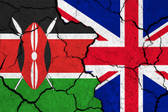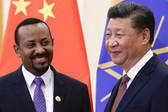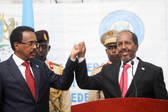Furthering Global Britain? Reviewing the Foreign Policy Effect of UK Engagement in East Africa
The project considered UK development investments in East Africa through the lenses of foreign policy, defence and security, and looked at their strategic relevance and effectiveness.
The 2021 Integrated Review sets out the UK government’s vision for Global Britain: an emphasis on openness as a source of prosperity; a more robust position on security and resilience; a renewed commitment to the UK as a force for good in the world; and an increased determination to seek multilateral solutions to challenges such as climate change.
This project analysed how significant UK development and defence investments are in contributing to selected Global Britain policy agendas in the Horn and East Africa.
The project assessed changes between 2021 and 2023 and looked back over the past six years to provide context and understand the extent of UK engagement in the region.
Project team
Simon Rynn
Former Senior Research Fellow, African Security
Michael Jones
Senior Research Fellow
Terrorism and Conflict
Jack Garnett
Former Project Officer, Terrorism and Conflict
Bianka Venkataramani
Guest Contributor
Joyce Kamau
Finance & Operations, RUSI Nairobi
Finance and Accounts
Luniya Msuku
RUSI Associate Fellow, Terrorism and Conflict
Aims and objectives
Using the East Africa region as a case study where the UK has deployed its full defence, diplomacy and development toolkit, the project aimed to test the extent to which the UK’s foreign policy inputs have contributed to policy outcomes.
The project sought to answer the following overarching research questions:
- How effective has the UK been in making a positive difference in relation to its 'Global Britain' objectives in the region?
- What role, if any, has UK development engagement had in supporting positive outcomes associated with 'Global Britain'?
- What role, if any, has UK defence and diplomatic engagement had in supporting the 'Global Britain' agenda?
- What impact have recent structural and policy changes had on the 'Global Britain' outcomes?
- What effect has the DFID-FCO merger had and is there a measurable shift in priorities, approach or perceptions of the UK?
- Have cuts to UK aid affected UK efforts to pursue the 'Global Britain' agenda?
- Have UK effectiveness and influence changed at all due to Brexit?
- How does the UK's approach and its impact differ compared to other countries?
- Is the UK approach more or less effective than that of other 'likeminded' partners in the region?
- Do other countries' approach have comparative or complementary advantages, such as China's particular focus on infrastructure?
- How do FCDO priorities in East Africa align with those of in-country governments and what are the in-country governments' expectations of and recommendations for FCDO?
Research methodology
The research methodology consisted of a review of selected policy literature and 182 semi-structured expert interviews carried out from mid-2021 to early 2023. The project’s lifespan was characterised by changes in government and policy direction in the UK as well as several social and political changes across all of the case study countries which ranged from violent conflict in Ethiopia, political changes and protests in Kenya, the near total collapse of Sudan, as well as ongoing unrest in Somalia.
All these developments have made it challenging to determine the longer-term impact on perceptions of the UK’s influence across East Africa. Despite this, the project led to the production of 4 country specific research papers as well as several commentaries, outlined by country below.
Related programme
Project outputs
The project produced several country research papers and commentaries focusing on Ethiopia, Kenya, Somalia, and Sudan, as well as papers and commentaries evaluating the UK’s foreign policy approach in East Africa more generally.
Papers

Commentaries

Project impact
The project brought together over 200 speakers and guests from a mix of policymakers, practitioners and academics across the defence, security, and development sectors from both the UK and the African continent at the landmark RUSI UK-Africa Conference on 20 April 2023.
The project’s findings and recommendations were shared widely among UK policy-makers and are in part reflected in the UK Government’s 2023 White Paper on International Development.






















